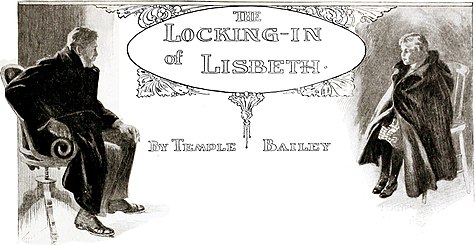
Christmas was the same as any other day to Judge Blair. He lived alone, and ate his Christmas dinner alone, and never gave presents. In fact, he was like the miller of Dee; for, since he cared for nobody, of course nobody cared for him.
On Christmas eve the judge stayed late at his office. His clerks left at five.
“A merry Christmas, Judge!” said Miss Jenkins, his type-writer, as she tied on a thick veil.
The judge looked up from his papers and stared at her over his glasses.
“What 's that? Oh— thank you, Miss Jenkins.” But he did not return her greeting, and timid little Miss Jenkins blushed, and wondered if she had been too bold.
At half-past six a waiter from a near-by restaurant brought in a light supper. The judge often supped at his office when he had an important case on hand. It saved time.
“A merry Christmas, suh.’” said the darky, when he had arranged the tray in front of the old gentleman.
“Hum? Oh, ah, yes—you may call for the tray later, George,” said the judge, and George departed crestfallen; and if he banged the door on which was painted in imposing gilt letters,
Attorney-at-law,
a little more vigorously than was necessary, why, who shall blame him?
The judge read over his brief while he ate, pausing now and then to pick up his lead-pencil and make corrections in his neat legal hand.
Suddenly he straightened up and looked around the room.
“Now what was that?” he murmured, looking up over his eye-glasses.
Top, tap, came a sound against the pane. He listened a moment, and then went back to his work; but, hearing it again, he rose and went to the window, and raised the shade.
There was a narrow space between the building in which the judge had his offices on the fourth floor and the big public school next to it. But the snow sifted in between, and it was very dark.
Suddenly out of the blackness came the end of a long wand, which hit the window-pane once, twice, quite sharply before the judge raised the sash with a bang.
“Who ’s that?” he cried harshly.
“Please,” said a very small voice across the way.
“Who ’s there?” asked the judge, peering into the darkness.
“It’s me,” said the little voice.
“Who ’s ‘me’?” demanded the judge.
“Lisbeth.”
“Where are you?”
“In the school-room. I ’ve tried and tried to get out, but I ’m locked in; and I ’ve been here all the afternoon,” the voice wailed.
“What?” exclaimed the judge.
“Yes, sir. I came back to get my books; and the girls had all gone home, and I s’pose the105
